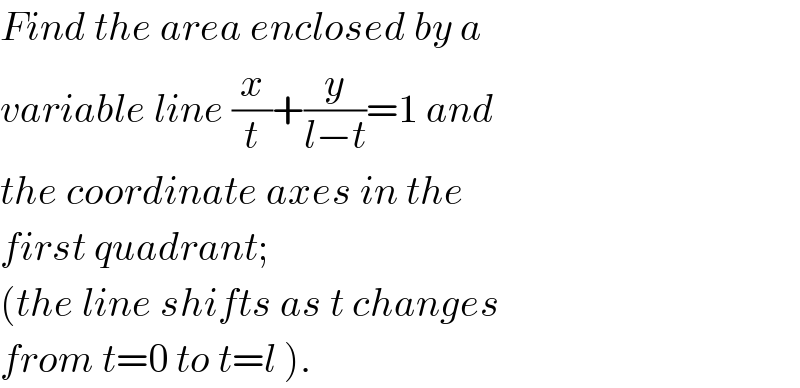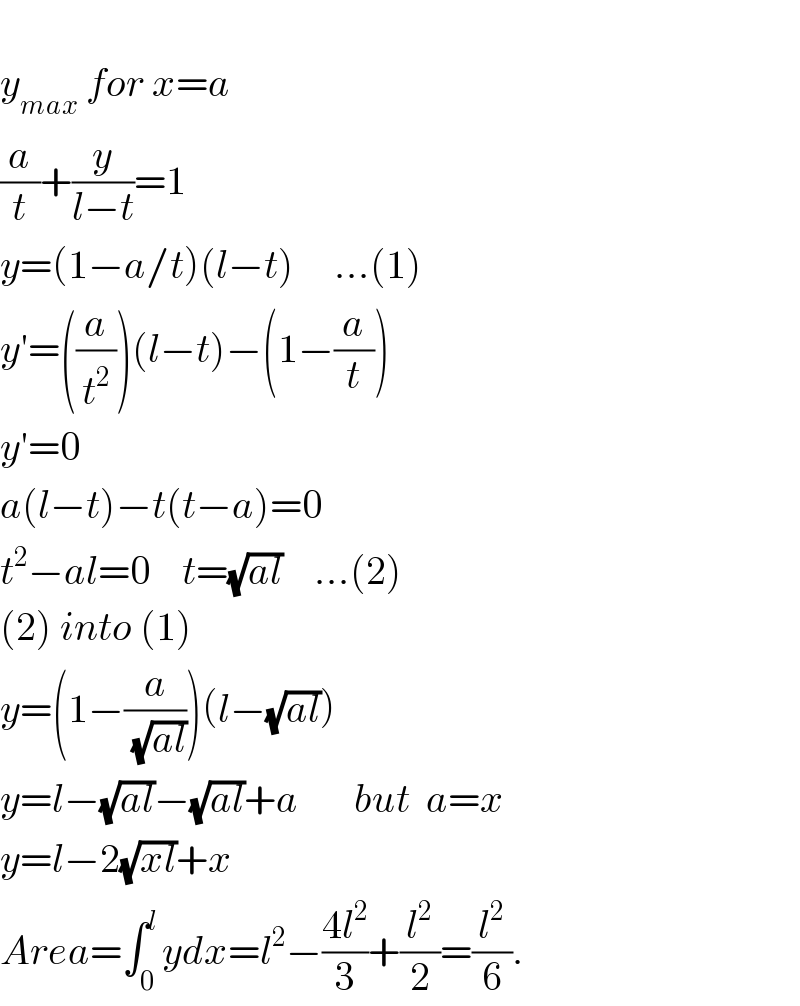
Question Number 25868 by ajfour last updated on 16/Dec/17

Commented by ajfour last updated on 16/Dec/17

$${Find}\:{the}\:{area}\:{enclosed}\:{by}\:{a} \\ $$$${variable}\:{line}\:\frac{{x}}{{t}}+\frac{{y}}{{l}−{t}}=\mathrm{1}\:{and} \\ $$$${the}\:{coordinate}\:{axes}\:{in}\:{the} \\ $$$${first}\:{quadrant};\: \\ $$$$\left({the}\:{line}\:{shifts}\:{as}\:{t}\:{changes}\right. \\ $$$$\left.{from}\:{t}=\mathrm{0}\:{to}\:{t}={l}\:\right). \\ $$
Commented by jota@ last updated on 16/Dec/17

$$ \\ $$$${y}_{{max}} \:{for}\:{x}={a} \\ $$$$\frac{{a}}{{t}}+\frac{{y}}{{l}−{t}}=\mathrm{1}\:\:\:\:\:\:\:\:\:\:\: \\ $$$${y}=\left(\mathrm{1}−{a}/{t}\right)\left({l}−{t}\right)\:\:\:\:\:...\left(\mathrm{1}\right) \\ $$$${y}'=\left(\frac{{a}}{{t}^{\mathrm{2}} }\right)\left({l}−{t}\right)−\left(\mathrm{1}−\frac{{a}}{{t}}\right) \\ $$$${y}'=\mathrm{0} \\ $$$${a}\left({l}−{t}\right)−{t}\left({t}−{a}\right)=\mathrm{0} \\ $$$${t}^{\mathrm{2}} −{al}=\mathrm{0}\:\:\:\:{t}=\sqrt{{al}}\:\:\:\:...\left(\mathrm{2}\right) \\ $$$$\left(\mathrm{2}\right)\:{into}\:\left(\mathrm{1}\right) \\ $$$${y}=\left(\mathrm{1}−\frac{{a}}{\sqrt{{al}}}\right)\left({l}−\sqrt{{al}}\right) \\ $$$${y}={l}−\sqrt{{al}}−\sqrt{{al}}+{a}\:\:\:\:\:\:\:{but}\:\:{a}={x} \\ $$$${y}={l}−\mathrm{2}\sqrt{{xl}}+{x} \\ $$$${Area}=\int_{\mathrm{0}} ^{{l}\:} {ydx}={l}^{\mathrm{2}} −\frac{\mathrm{4}{l}^{\mathrm{2}} }{\mathrm{3}}+\frac{{l}^{\mathrm{2}} }{\mathrm{2}}=\frac{{l}^{\mathrm{2}} }{\mathrm{6}}. \\ $$
Commented by ajfour last updated on 16/Dec/17

$${beyond}\:{all}\:{praise}!\:{thanks}. \\ $$
